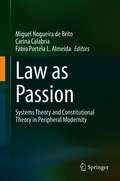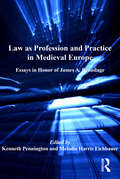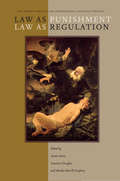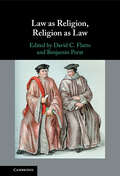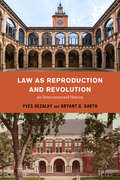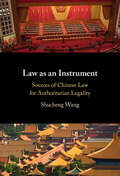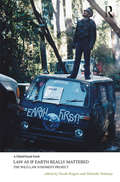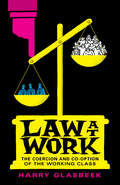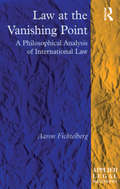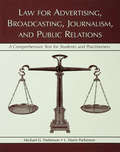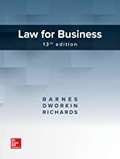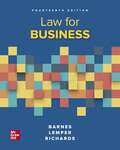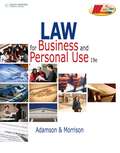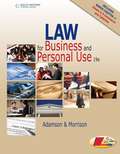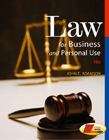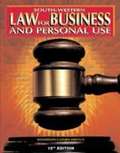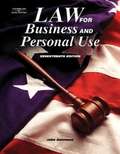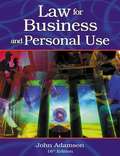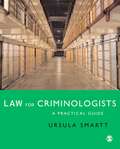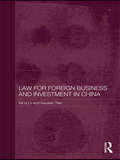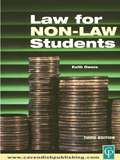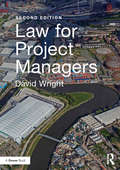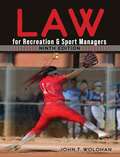- Table View
- List View
Law as Passion: Systems Theory and Constitutional Theory in Peripheral Modernity
by Miguel Nogueira de Brito Carina Calabria Fábio Portela L. AlmeidaInspired by the works of Professor Marcelo Neves, in this book colleagues come together to explore how their research has been influenced by non-European and post-colonial approaches. With a foreword by Karl-Heinz Ladeur, it features essays written by leading scholars in the fields of sociology of law and constitutional theory – including Hauke Brunkhorst, Darío Rodrígues, Kimmo Nuotio and Pablo Holmes.The content is divided into four sections, the first of which, “Law, State, and Global Crisis,” covers topics related to the modern constitutional state, the crisis of global capitalism, and the global rule of law. The second, “Symbolic Constitutionalization,” analyzes challenges to constitutionalism in the “Peripheral Modernity.” The authors in the third section examine how the concept of “Transconstitutionalism” can shed new light on contemporary debates concerning global public law. In turn, the last section of the book, “Systems Theory and Public Law,” addresses systems theory issues in the fields of legal history and administrative law.The book presents a relevant and original discussion encompassing such diverse fields as constitutional theory, international law, systems theory, and sociology of constitutions.
Law as Profession and Practice in Medieval Europe: Essays in Honor of James A. Brundage
by Kenneth Pennington Melodie Harris EichbauerThis volume brings together papers by a group of scholars, distinguished in their own right, in honour of James Brundage. The essays are organised into four sections, each corresponding to an important focus of Brundage's scholarly work. The first section explores the connection between the development of medieval legal and constitutional thought. Thomas Izbicki, Kenneth Pennington, and Charles Reid, Jr. explore various aspects of the jurisprudence of the Ius commune, while James Powell, Michael Gervers and Nicole Hamonic, Olivia Robinson, and Elizabeth Makowski examine how that jurisprudence was applied to various medieval institutions. Brian Tierney and James Muldoon conclude this section by demonstrating two important points: modern ideas of consent in the political sphere and fundamental principles of international law attributed to sixteenth century jurists like Hugo Grotius have deep roots in medieval jurisprudential thought. Patrick Zutshi, R. H. Helmholz, Peter Landau, Marjorie Chibnall, and Edward Peters have written essays that augment Brundage's work on the growth of the legal profession and how traces of a legal education began to emerge in many diverse arenas. The influence of legal thinking on marriage and sexuality was another aspect of Brundage's broad interests. In the third section Richard Kay, Charles Donahue, Jr., and Glenn Olsen explore the intersection of law and marriage and the interplay of legal thought on a central institution of Christian society. The contributions of Jonathan Riley-Smith and Robert Somerville in the fourth section round-out the volume and are devoted to Brundage's path-breaking work on medieval law and the crusading movement. The volume also includes a comprehensive bibliography of Brundage's work.
Law as Punishment / Law as Regulation
by Austin Sarat Lawrence Douglas Martha Merrill UmphreyLaw depends on various modes of classification. How an act or a person is classified may be crucial in determining the rights obtained, the procedures employed, and what understandings get attached to the act or person. Critiques of law often reveal how arbitrary its classificatory acts are, but no one doubts their power and consequence. This crucial new book considers the problem of law's physical control of persons and the ways in which this control illuminates competing visions of the law: as both a tool of regulation and an instrument of coercion or punishment. It examines various instances of punishment and regulation to illustrate points of overlap and difference between them, and captures the lived experience of the state's enterprise of subjecting human conduct to the governance of rules. Ultimately, the essays call into question the adequacy of a view of punishment and/or regulation that neglects the perspectives of those who are at the receiving end of these exercises of state power.
Law as Religion, Religion as Law
by Benjamin Porat David C. FlattoThe conventional approach to law and religion assumes that these are competing domains, which raises questions about the freedom of, and from, religion; alternate commitments of religion and human rights; and respective jurisdictions of civil and religious courts. This volume moves beyond this competitive paradigm to consider law and religion as overlapping and interrelated frameworks that structure the social order, arguing that law and religion share similar properties and have a symbiotic relationship. Moreover, many legal systems exhibit religious characteristics, informing their notions of authority, precedent, rituals and canonical texts, and most religions invoke legal concepts or terminology. The contributors address this blurring of law and religion in the contexts of political theology, secularism, church-state conflicts, and the foundational idea of divine law.
Law as Reproduction and Revolution: An Interconnected History
by Bryant G. GarthA free open access ebook is available upon publication. Learn more at www.luminosoa.org This sweeping book details the extent to which the legal revolution emanating from the US has transformed legal hierarchies of power across the globe, while also analyzing the conjoined global histories of law and social change from the Middle Ages to today. It examines the global proliferation of large corporate law firms—a US invention—along with US legal education approaches geared toward those corporate law firms. This neoliberal-inspired revolution attacks complacent legal oligarchies in the name of America-inspired modernism. Drawing on the combined histories of the legal profession, imperial transformations, and the enduring and conservative role of cosmopolitan elites at the top of legal hierarchies, the book details case studies in India, Hong Kong, South Korea, Japan, and China to explain how interconnected legal histories are stories of both revolution and reproduction. Theoretically and methodologically ambitious, it offers a wholly new approach to studying interrelated fields across time and geographies.
Law as an Instrument: Sources of Chinese Law for Authoritarian Legality
by Shucheng WangHow can the law be employed pragmatically to facilitate development and underpin illiberal principles? The case of contemporary China shows that the law plays an increasingly important role in the country's illiberal approach to both domestic and China-related global affairs, which has posed intellectual challenges in understanding it with reference to conventional, Western legal concepts and theories. This book provides a systematic exploration of the sources of Chinese law as pragmatically reconfigured in context, aiming to fill the gap between written and practised law. In combination with fieldwork investigations, it conceptualises various formal and informal laws, including the Constitution, congressional statutes, supreme court interpretations, judicial documents, guiding cases and judicial precedents. Moreover, it engages a theoretical analysis of legal instrumentalism, illuminating how and why the law works as an instrument for authoritarian legality in China, with international reflections on other comparable regimes.
Law as if Earth Really Mattered: The Wild Law Judgment Project (Law, Justice and Ecology)
by Nicole Rogers Michelle MaloneyThis book is a collection of judgments drawn from the innovative Wild Law Judgment Project. In participating in the Wild Law Judgment Project, which was inspired by various feminist judgment projects, contributors have creatively reinterpreted judicial decisions from an Earth-centred point of view by rewriting existing judgments, or creating fictional judgments, as wild law. Authors have confronted the specific challenges of aligning existing Western legal systems with Thomas Berry’s philosophy of Earth jurisprudence through judgment writing and rewriting. This book thus opens up judicial decision-making and the common law to critical scrutiny from a wild law or Earth-centred perspective. Based upon ecocentric rather than human-centred or anthropocentric principles, Earth jurisprudence poses a unique critical challenge to the dominant anthropocentric or human-centred focus and orientation of the common law. The authors interrogate the anthropocentric and property rights assumptions embedded in existing common law by placing Earth and the greater community of life at the centre of their rewritten and hypothetical judgments. Covering areas as diverse as tort law, intellectual property law, criminal law, environmental law, administrative law, international law, native title law and constitutional law, this unique collection provides a valuable tool for practitioners and students who are interested in learning more about the emerging ecological jurisprudence movement. It helps us to see more clearly what a new system of law might look like: one in which Earth really matters.
Law at Work: The Coercion and Co-option of the Working Class
by Harry GlasbeekIn a series of illuminating essays, the renowned Harry Glasbeek unpacks how law has been used to ensure that workers' aspirations are kept in check. Law at Work uncovers how the legal system, through its structures and mechanisms, legitimizes and reinforces the exploitation of workers. Using historic and contemporary examples, Glasbeek illustrates how conscious manipulations of law are part and parcel of how law protects capitalists at the expense of workers. He proves how the very laws designed to safeguard rights and freedoms often act as invisible shackles, compelling readers to reflect on their own struggles as they navigate a world where the legal system fails to serve their interests. These manipulations are made to look innocent because the underlying structures and ideology which give rise to specific rules are not challenged or challengeable. This thought-provoking book is an indispensable resource for those seeking to understand the hidden dynamics of worker oppression, empowering readers to question prevailing narratives and envision a future where the law truly serves the interests of all.
Law at the Vanishing Point: A Philosophical Analysis of International Law (Applied Legal Philosophy)
by Aaron FichtelbergTwo central questions are at the core of international legal theory: 'What is international law?', and 'Is international law really law?' This volume examines these critical questions and the philosophical foundations of modern international law using the tools of Anglo-American legal theory and western political thought. Engaging with both contemporary and historical legal theory and with an analysis of international law in action, the book builds an understanding and theory of law from the perspective of those who actually use this legal system and understand it, rather than constructing an artificial system from the standpoint of political scientists and moral philosophers. Law at the Vanishing Point provides a fascinating new challenge to those who reduce international law either to ethics or to politics and provides a critical new appraisal of its power as an independent force in human social relations.
Law for Advertising, Broadcasting, Journalism, and Public Relations: A Comprehensive Text For Students And Practitioners (Routledge Communication Series)
by Michael G. Parkinson L. Marie ParkinsonThis exceptional new text offers an up-to-date and integrated approach to communication law. Written by two practicing attorneys with extensive experience teaching the communication law course, Law for Advertising, Broadcasting, Journalism, and Public Relations covers the areas of communication law essential and most relevant for readers throughout the communication curriculum. Its integrated approach will serve students and practitioners in advertising and public relations as well as those in journalism and electronic media.Providing background to help readers understand legal concepts, this comprehensive communication law text includes an introduction to the legal system; covers legal procedures, structures, and jurisdictions; discusses the First Amendment and electronic media regulations; and considers issues of access. Additional material includes: *intellectual property law; *employment and agency law, with explanations of how these laws create obligations for mass communication professionals and their employees; *commercial communication laws; and *special laws and regulations that impact reporters, public relations practitioners, and advertisers who deal with stock sales.Special features of this text include:*Magic Words and Phrases--defining legal terms;*Cases--illustrating key points in each chapter;*Practice Notes--highlighting points of particular interest to professional media practices;*Instructions on finding and briefing cases, with a sample brief; and*Examples of legal documents and jury instructions.This text is intended as an introduction to communication law for students and practitioners in mass communication, journalism, advertising, broadcasting, telecommunications, and public relations.
Law for Business
by Eric L. Richards A. James Barnes Terry Morehead DworkinBusiness Law 10/e has provided students with a comprehensive, yet concise treatment of the legal issues of fundamental importance to business students and the business profession. The cases, which have always been a strong feature, are edited and re-written by the authors, who divide the material into three categories: facts, issues, decisions. The authors, Barnes, Dworkin, and Richards, choose cases that are appropriate to explain precedent and history as well as include “hot topic” cases that relate to current events. In addition to case applications, the authors use such techniques as content summaries to apply concepts to practice. Effective managers and employees must develop knowledge of both law and business because people involved in business also are involved in, and greatly affected by, the laws concerning business.
Law for Business
by Eric L. Richards A. James Barnes Timothy A. LemperA focus on readability and proven pedagogical devices ensures Law for Business is a student-friendly perspective that will aid students in their comprehension and critical analysis of often complex topics in business law. It’s comprehensive, yet concise approach is appealing to both students and instructors alike giving instructors flexibility and students the ability to understand the fundamental importance of how legal issues impact decision making in business.
Law for Business
by John E. Adamson Edward J. Conry Norbert J. MietusThis text effectively teaches an understanding of legal obligations and rights in business, and how to avoid legal difficulties. Law For Business effectively covers areas such as computer law, financial crimes, legal careers, environmental law, international law, and more.
Law for Business and Personal Use
by John E. Adamson Amanda MorrisonLAW FOR BUSINES AND PERSONAL USE, 19E provides instruction on the foundations of business law as well as the application of legal concepts to everyday life.
Law for Business and Personal Use
by John E. AdamsonAdamson (business, Southwest Missouri State University) outlines the U. S. legal system and explains how various laws apply to the rights and duties of small businesses. The 32 chapters discuss civil procedure, contract law, leasing of real property, wills and trusts, employment law, legal forms of business organization, and financial transactions. Annotation ©2006 Book News, Inc. , Portland, OR (booknews. com)
Law for Business and Personal Use
by John E. Adamson Norbert J. MietusThis 15th edition of Law for Business and Personal Use maintains a fundamental emphasis on business law, while introducing personal law topics that interest students. Give your students the most comprehensive coverage of contracts, ethics, employment law, credit, banking, partnerships, bankruptcy, etc.
Law for Business and Personal Use
by John E. AdamsonAdamson (business, Southwest Missouri State University) outlines the U. S. legal system and explains how various laws apply to the rights and duties of small businesses. The 32 chapters discuss civil procedure, contract law, leasing of real property, wills and trusts, employment law, legal forms of business organization, and financial transactions. Annotation ©2006 Book News, Inc. , Portland, OR (booknews. com)
Law for Business and Personal Use (16th edition)
by John E. AdamsonAdamson (business, Southwest Missouri State University) outlines the U. S. legal system and explains how various laws apply to the rights and duties of small businesses. The 32 chapters discuss civil procedure, contract law, leasing of real property, wills and trusts, employment law, legal forms of business organization, and financial transactions.
Law for Criminologists: A Practical Guide
by Mrs Ursula SmarttBook launch pictures available here! 'This book is a triumph in its clarity, scholarship and sheer scope. It is increasingly vital that criminologists understand crime and the criminal justice system in depth, and Ursula Smartt unmasks the mysteries and lays bare the complexities of law like few other writers on the subject. This is the book on criminal law that should be on the shelf of everyone connected to the criminal law' - Baroness Helena Kennedy QC 'Law for Criminologists is a timely and concise introduction for those in criminology and law. Combining accessibility and scholarship, it will be welcomed by students and lecturers alike' - Dr Azrini Wahidin, Reader and Programme Director for Criminology, Queen's University Belfast 'Highly informative, comprehensive and reader-friendly - this groundbreaking book is essential reading for all who are engaged in the study of criminology' - Peter Joyce, Manchester Metropolitan University This practical guide introduces students to the basic principles of the law, enabling a comprehensive understanding of criminology and criminal justice. Law for Criminologists will enthuse the student and teacher about the law whilst giving sound advice on how to achieve a thorough comprehension of the topic. Striking a much-needed balance between essential law for criminologists, and commentary on current legal issues, this book provides the reader with a full understanding of: " the workings of the law in England, Wales, Scotland and Northern Ireland " the European Union legal frameworks " the law of evidence and the criminal process " punishment and sentencing " human rights issues " the differences between youth justice and adult criminal legislation " how to undertake independent legal research and further reading in the discipline. Packed with extensive learning aids including case studies, boxed notes, sample examination questions, appendices of statutes and cases and a comprehensive glossary, this book is vital for all students in criminology and criminal justice. As well as an extensive foreword by Baroness Helena Kennedy QC.
Law for Entrepreneurs
by Jethro K. Lieberman Don Mayer Daniel M. Warner George J. SiedelMayer, Warner, Siedel and Lieberman's Law for Entrepreneurs is an up-to-date textbook that covers the broad spectrum of legal issues that entrepreneurs must understand when starting and running a business. The text is organized to permit instructors to tailor the materials to their particular approach. The authors take special care to engage students by relating law to everyday events with their clear, concise and readable style. After introductory chapters covering the legal environment of business, Law for Entrepreneurs provides students with context and essential legal concepts relating to contracts, product liability, intellectual property, insurance, agency law, partnerships, corporations, and employment law. The text provides the vocabulary and legal savvy that entrepreneurs need to talk in an educated way to customers, suppliers, employees, creditors, shareholders, government regulators and other stakeholders — and to their own lawyers. With Law for Entrepreneurs, the authors have created a text that not only has both case summaries and excerpted cases, but one that you can easily customize by deleting chapters, reordering the content, adding your own material, and even editing at the line level with Flat World's easy-to-use MIYO (Make It Your Own) Platform. The free online version of the text includes embedded links to law-related videos at YouTube and other online sites for easy access by students and instructors.
Law for Foreign Business and Investment in China
by Xiaowen Tian Vai Io LoIn trying to establish a presence in China, foreign investors have found it imperative to understand the regulatory environment of this potentially huge market. This book provides an up-to-date overview of the legal framework for doing business in China. It covers such topics as state structure; legislative amendments and enactments on direct foreign investment; the court system; the legal profession; business entities; foreign investment enterprises; contracts; intellectual property; labor and employment; consumer protection; taxation; securities; and dispute resolution. Apart from explaining legal principles, the book highlights liberalisation measures that China has undertaken to fulfil its WTO commitments; elucidates complicated legal concepts with examples of court decisions; discusses relevant foreign trade and investment polices; and includes a glossary of Chinese terms.
Law for Non-Law Students
by Keith OwensLaw for Non-Law Students is written in a clear and readable style and aims to make the law understandable for readers at undergraduate or comparable level. It explains the practical influences under which the law has been formed,so that the student will be better able to understand why the law has developed in the way that it has. It gives lots of straightforward examples as to how the law works in practice and aims to equip students with the ability to appraise the effectiveness of the law in a particular circumstance rather than simply providing a list of rules for the student to regurgitate at exam time. The facts of the more important cases are given in some detail to enable the student to appreciate the range of factors which the court may have taken into account in reaching its decision. The new edition has been updated to take account of all recent developments, both in relation to statute and to case law. Certain chapters, particularly in the area of sale of goods, have been substantially rewritten and expanded in an attempt to give more detail, while at the same time remaining student-friendly. New chapters on Agency and Negligence have been added. brThis new edition should be suitable for most courses which have a law element.
Law for Project Managers
by David WrightLaw for Project Managers provides an easily understandable and practical guide to the laws of contract, liability, intellectual property and so on, entirely from the perspective of the project manager. It will enable you to approach projects forewarned and forearmed, able to avoid potential legal problems altogether. The book covers everything from intellectual property disputes with the client organisation about who actually 'owns' the outcome, to confusion arising during an international project from the different legal systems and their approach to contracts and health and safety problems in the management of contractors. Most importantly, it explains everything in very straightforward terms; legal jargon is either avoided altogether or defined with its relevance to the project manager explained. In essence, Law for Project Managers is a clear, readable and expert guide on this and many other important legal matters for the practising project manager as well as a supplementary text for post- or undergraduate students studying the commercial aspects of law, contracting and project management.
Law for Recreation and Sport Managers
by John WolohanSince 1997, Law for Recreation and Sport Managers has been the leading recreation and sports law book for undergraduate and graduate sport management and recreation programs. Key Features: Up-to-date on current court cases Each chapter is written by leading recreation and sport law professors and experts in the field. Each chapter follows an easy-to-read format. Each chapter examines a significant case and reviews how the courts apply the fundamental legal concepts. Designed for both undergraduate and graduate students, the book is divided into seven approachable sections plus additional materials that educates readers on the complex issues of recreation and sport law. Also included: Supplemental cases online – In addition to the significant cases in each chapter, students can now access additional select cases online to further illustrate important concepts. Chapter sidebars - Each chapter now includes a sidebar, an interesting point of law or a new ruling that presents a new idea. End of chapter reviews - Students are encouraged to engage with the material by answering the end of chapter question prompts.
